初中英语语法拓展:情态动词can和could的用法
- 格式:wps
- 大小:18.50 KB
- 文档页数:2
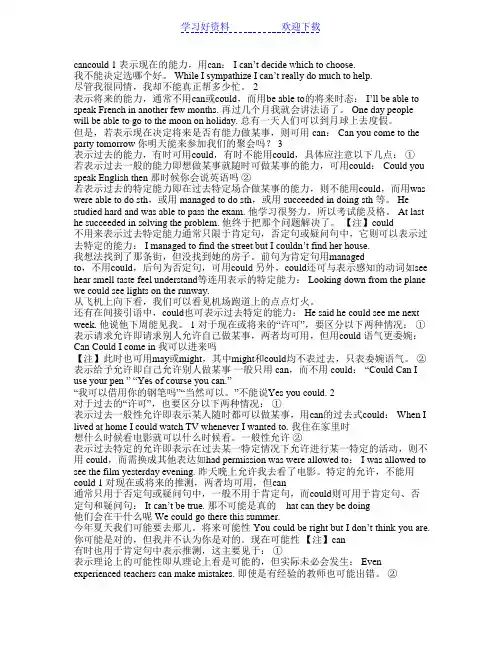
cancould 1 表示现在的能力,用can: I can’t decide which to choose.我不能决定选哪个好。
While I sympathize I can’t really do much to help.尽管我很同情,我却不能真正帮多少忙。
2表示将来的能力,通常不用can或could,而用be able to的将来时态: I’ll be able to speak French in another few months. 再过几个月我就会讲法语了。
One day people will be able to go to the moon on holiday. 总有一天人们可以到月球上去度假。
但是,若表示现在决定将来是否有能力做某事,则可用 can: Can you come to the party tomorrow 你明天能来参加我们的聚会吗? 3表示过去的能力,有时可用could,有时不能用could,具体应注意以下几点:①若表示过去一般的能力即想做某事就随时可做某事的能力,可用could: Could you speak English then 那时候你会说英语吗②若表示过去的特定能力即在过去特定场合做某事的能力,则不能用could,而用was were able to do sth,或用 managed to do sth,或用 succeeded in doing sth 等。
He studied hard and was able to pass the exam. 他学习很努力,所以考试能及格。
At last he succeeded in solving the problem. 他终于把那个问题解决了。
【注】could不用来表示过去特定能力通常只限于肯定句,否定句或疑问句中,它则可以表示过去特定的能力: I managed to find the street but I couldn’t find her house.我想法找到了那条街,但没找到她的房子。
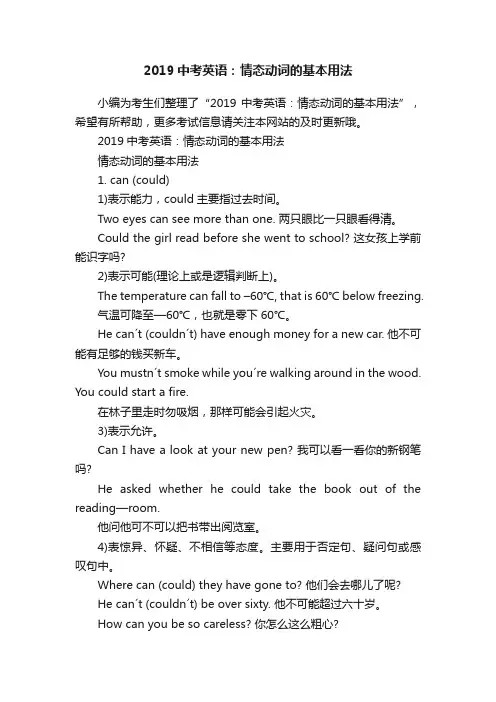
2019中考英语:情态动词的基本用法小编为考生们整理了“2019中考英语:情态动词的基本用法”,希望有所帮助,更多考试信息请关注本网站的及时更新哦。
2019中考英语:情态动词的基本用法情态动词的基本用法1. can (could)1)表示能力,could主要指过去时间。
Two eyes can see more than one. 两只眼比一只眼看得清。
Could the girl read before she went to school? 这女孩上学前能识字吗?2)表示可能(理论上或是逻辑判断上)。
The temperature can fall to –60℃, that is 60℃ below freezing.气温可降至—60℃,也就是零下60℃。
He can´t (couldn´t) have enough money for a new car. 他不可能有足够的钱买新车。
You mustn´t smoke while you´re walking around in the wood. You could start a fire.在林子里走时勿吸烟,那样可能会引起火灾。
3)表示允许。
Can I have a look at your new pen? 我可以看一看你的新钢笔吗?He asked whether he could take the book out of the reading—room.他问他可不可以把书带出阅览室。
4)表惊异、怀疑、不相信等态度。
主要用于否定句、疑问句或感叹句中。
Where can (could) they have gone to? 他们会去哪儿了呢?He can´t (couldn´t) be over sixty. 他不可能超过六十岁。
How can you be so careless? 你怎么这么粗心?5)比较委婉客气地提出问题或陈述看法。
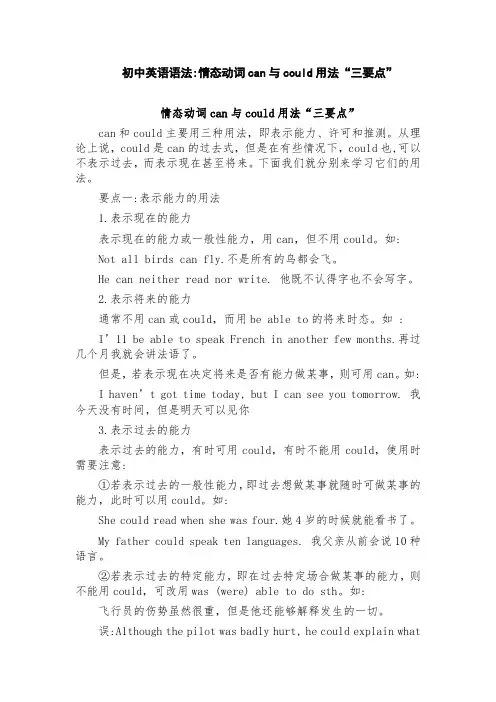
初中英语语法:情态动词can与could用法“三要点”情态动词can与could用法“三要点”can和could主要用三种用法,即表示能力、许可和推测。
从理论上说,could是can的过去式,但是在有些情况下,could也,可以不表示过去,而表示现在甚至将来。
下面我们就分别来学习它们的用法。
要点一:表示能力的用法1.表示现在的能力表示现在的能力或一般性能力,用can,但不用could。
如:Not all birds can fly.不是所有的鸟都会飞。
He can neither read nor write. 他既不认得字也不会写字。
2.表示将来的能力通常不用can或could,而用be able to的将来时态。
如 :I’11 be able to speak French in another few months.再过几个月我就会讲法语了。
但是,若表示现在决定将来是否有能力做某事,则可用can。
如:I haven’t got time today, but I can see you tomorrow. 我今天没有时间,但是明天可以见你3.表示过去的能力表示过去的能力,有时可用could,有时不能用could,使用时需要注意:①若表示过去的一般性能力,即过去想做某事就随时可做某事的能力,此时可以用could。
如:She could read when she was four.她4岁的时候就能看书了。
My father could speak ten languages. 我父亲从前会说10种语言。
②若表示过去的特定能力,即在过去特定场合做某事的能力,则不能用could,可改用was (were) able to do sth。
如:飞行员的伤势虽然很重,但是他还能够解释发生的一切。
误:A1though the pilot was badly hurt, he could explain whathad happened正:Although the pilot was badly hurt, he was able to explain what had happened.句中说的“能够”解释当时所发生的一切,显然是过去特定场合所具有的能力,所以不能用could。
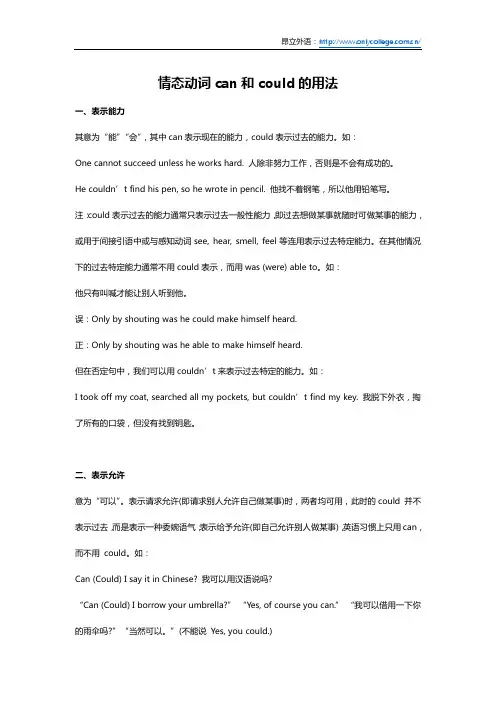
情态动词can和could的用法一、表示能力其意为“能”“会”,其中can表示现在的能力,could表示过去的能力。
如:One cannot succeed unless he works hard. 人除非努力工作,否则是不会有成功的。
He couldn’t find his pen, so he wrote in pencil. 他找不着钢笔,所以他用铅笔写。
注:could表示过去的能力通常只表示过去一般性能力,即过去想做某事就随时可做某事的能力,或用于间接引语中或与感知动词see, hear, smell, feel等连用表示过去特定能力。
在其他情况下的过去特定能力通常不用could表示,而用was (were) able to。
如:他只有叫喊才能让别人听到他。
误:Only by shouting was he could make himself heard.正:Only by shouting was he able to make himself heard.但在否定句中,我们可以用couldn’t来表示过去特定的能力。
如:I took off my coat, searched all my pockets, but couldn’t find my key. 我脱下外衣,掏了所有的口袋,但没有找到钥匙。
二、表示允许意为“可以”。
表示请求允许(即请求别人允许自己做某事)时,两者均可用,此时的could 并不表示过去,而是表示一种委婉语气;表示给予允许(即自己允许别人做某事),英语习惯上只用can,而不用could。
如:Can (Could) I say it in Chinese? 我可以用汉语说吗?“Can (Could) I borrow your umbrella?” “Yes, of course you can.” “我可以借用一下你的雨伞吗?”“当然可以。
”(不能说Yes, you could.)注:以上说的是针对现在或将来情况而言的,若谈的是过去情况,则过去could只用于表示过去一般性允许(即表示某人随时都可以做某事),而不表示特定的允许(即表示在过去某一特定情况下允许进行某一特定的活动),遇此情况需换成其他表达。
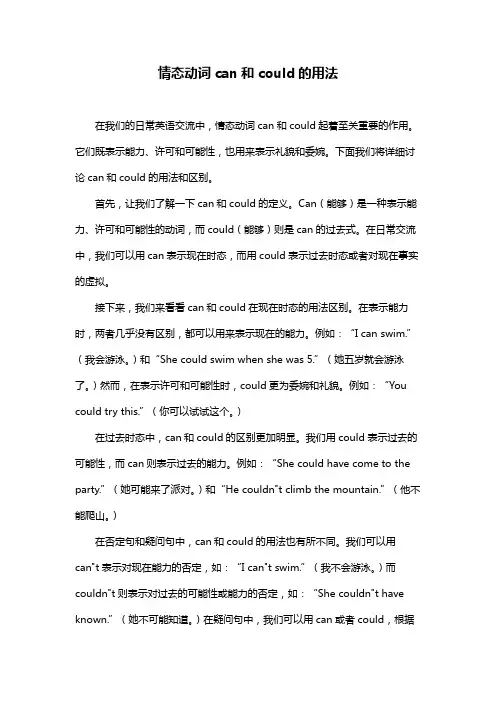
情态动词can和could的用法在我们的日常英语交流中,情态动词can和could起着至关重要的作用。
它们既表示能力、许可和可能性,也用来表示礼貌和委婉。
下面我们将详细讨论can和could的用法和区别。
首先,让我们了解一下can和could的定义。
Can(能够)是一种表示能力、许可和可能性的动词,而could(能够)则是can的过去式。
在日常交流中,我们可以用can表示现在时态,而用could表示过去时态或者对现在事实的虚拟。
接下来,我们来看看can和could在现在时态的用法区别。
在表示能力时,两者几乎没有区别,都可以用来表示现在的能力。
例如:“I can swim.”(我会游泳。
)和“She could swim when she was 5.”(她五岁就会游泳了。
)然而,在表示许可和可能性时,could更为委婉和礼貌。
例如:“You could try this.”(你可以试试这个。
)在过去时态中,can和could的区别更加明显。
我们用could表示过去的可能性,而can则表示过去的能力。
例如:“She could have come to the party.”(她可能来了派对。
)和“He couldn"t climb the mountain.”(他不能爬山。
)在否定句和疑问句中,can和could的用法也有所不同。
我们可以用can"t表示对现在能力的否定,如:“I can"t swim.”(我不会游泳。
)而couldn"t则表示对过去的可能性或能力的否定,如:“She couldn"t have known.”(她不可能知道。
)在疑问句中,我们可以用can或者could,根据语境选择。
例如:“Can you help me?”(你能帮我吗?)或者:“Could you help me?”(你能帮我吗?)最后,我们来看看一些常见的错误和实用建议。

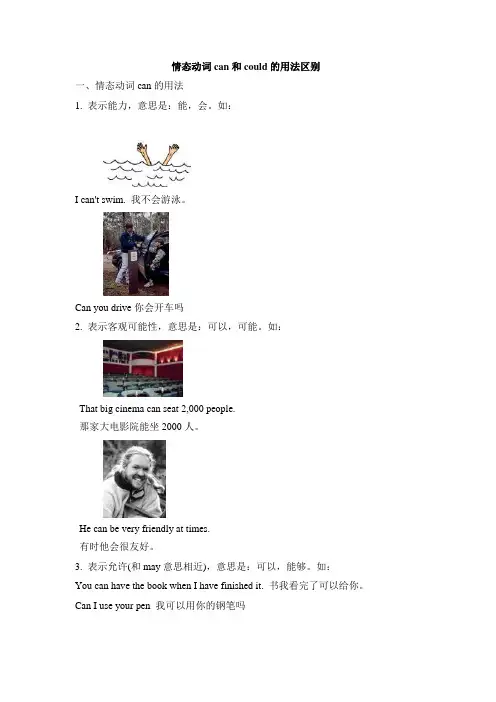
情态动词can和could的用法区别一、情态动词can的用法1. 表示能力,意思是:能,会。
如:I can't swim. 我不会游泳。
Can you drive你会开车吗2. 表示客观可能性,意思是:可以,可能。
如:That big cinema can seat 2,000 people.那家大电影院能坐2000人。
He can be very friendly at times.有时他会很友好。
3. 表示允许(和may意思相近),意思是:可以,能够。
如:You can have the book when I have finished it. 书我看完了可以给你。
Can I use your pen 我可以用你的钢笔吗4. 表示惊异、不相信等(用于疑问句、否定句或感叹句中),意思是:会,可能。
如:This can't be true. 这不可能是真的。
Can it be true 这可能是真的吗二、情态动词could的用法1. 表示“能力”或“可能性”,作为can的过去形式。
如:Could you speak English then 那时你能讲英语吗He said he couldn't follow me.他说他跟不上我。
2. 表示惊异、怀疑、不相信等情绪。
如:Who could have taken them 谁会把它们拿走了呢She couldn't have left so soon. 她不可能这么快就走了。
在这种情况下,could和can是可以换用的,用could时口气较缓和,用can时不相信的程度更强一些,两者在时间上没有差别。
3. 比较委婉客气地提出问题或陈述看法。
如:—Could you let me have your passport—Yes, here it is.—看看你的护照好吗—行,这就是。
I could come earlier, if necessary. 如果必要我可以早点来。
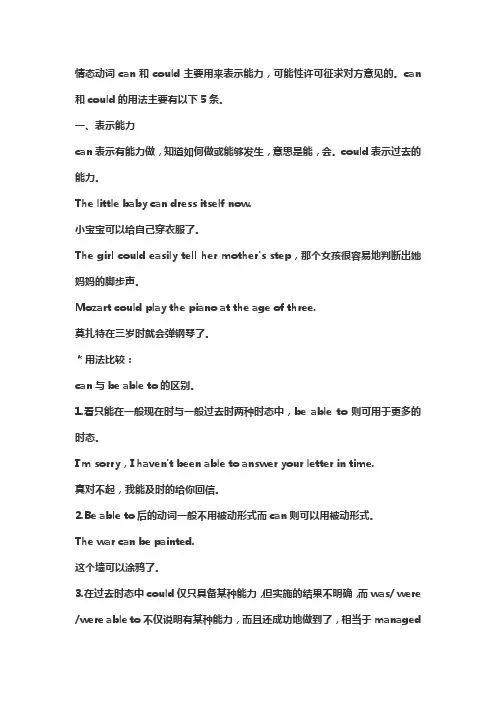
情态动词can和could主要用来表示能力,可能性许可征求对方意见的。
can 和could的用法主要有以下5条。
一、表示能力can表示有能力做,知道如何做或能够发生,意思是能,会。
could表示过去的能力。
The little baby can dress itself now.小宝宝可以给自己穿衣服了。
The girl could easily tell her mother's step,那个女孩很容易地判断出她妈妈的脚步声。
Mozart could play the piano at the age of three.莫扎特在三岁时就会弹钢琴了。
*用法比较:can与be able to的区别。
1.看只能在一般现在时与一般过去时两种时态中,be able to则可用于更多的时态。
I'm sorry,I haven't been able to answer your letter in time.真对不起,我能及时的给你回信。
2.Be able to后的动词一般不用被动形式而can则可以用被动形式。
The war can be painted.这个墙可以涂鸦了。
3.在过去时态中could仅只具备某种能力,但实施的结果不明确,而was/ were /were able to不仅说明有某种能力,而且还成功地做到了,相当于managedI talked with the boy for a long time and eventually I was able to make him believe me.我和那个男孩谈了很久,最终还是让他相信了我的话。
二、表示可能性1.用在肯定句中,表示理论上的可能性,指常有的行为或情形,意思是有时会……。
Tom can be really annoying.他们有时的确令人讨厌。
It can be very hot here in summer.这里夏天有时会很热。
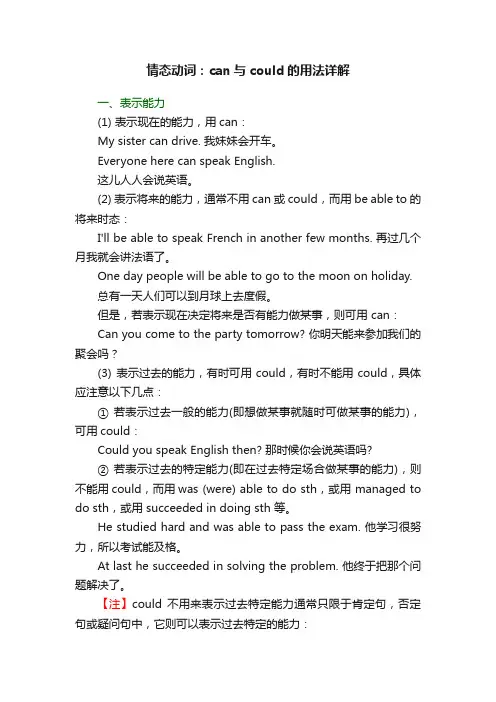
情态动词:can与could的用法详解一、表示能力(1) 表示现在的能力,用can:My sister can drive. 我妹妹会开车。
Everyone here can speak English.这儿人人会说英语。
(2) 表示将来的能力,通常不用can或could,而用be able to的将来时态:I'll be able to speak French in another few months. 再过几个月我就会讲法语了。
One day people will be able to go to the moon on holiday.总有一天人们可以到月球上去度假。
但是,若表示现在决定将来是否有能力做某事,则可用 can:Can you come to the party tomorrow? 你明天能来参加我们的聚会吗?(3) 表示过去的能力,有时可用could,有时不能用could,具体应注意以下几点:① 若表示过去一般的能力(即想做某事就随时可做某事的能力),可用could:Could you speak English then? 那时候你会说英语吗?② 若表示过去的特定能力(即在过去特定场合做某事的能力),则不能用could,而用was (were) able to do sth,或用 managed to do sth,或用 succeeded in doing sth 等。
He studied hard and was able to pass the exam. 他学习很努力,所以考试能及格。
At last he succeeded in solving the problem. 他终于把那个问题解决了。
【注】could 不用来表示过去特定能力通常只限于肯定句,否定句或疑问句中,它则可以表示过去特定的能力:I managed to find the street, but I couldn't find her house. 我想法找到了那条街,但没找到她的房子。
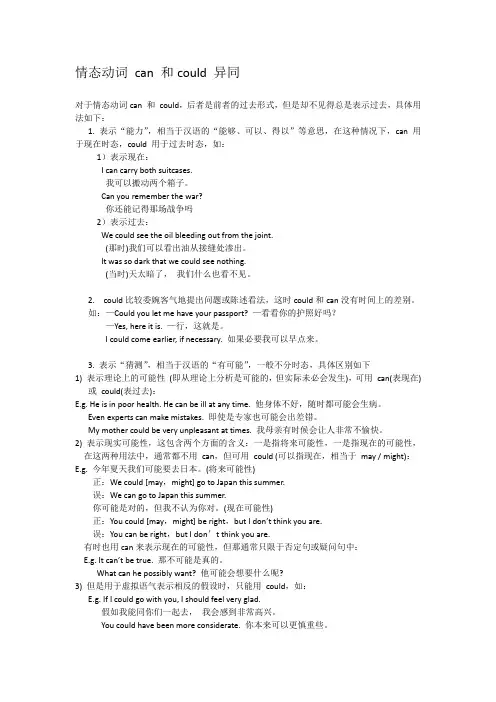
情态动词can 和could 异同对于情态动词can 和could,后者是前者的过去形式,但是却不见得总是表示过去,具体用法如下:1. 表示“能力”,相当于汉语的“能够、可以、得以”等意思,在这种情况下,can 用于现在时态,could 用于过去时态,如:1)表示现在:I can carry both suitcases.我可以搬动两个箱子。
Can you remember the war?你还能记得那场战争吗2)表示过去:We could see the oil bleeding out from the joint.(那时)我们可以看出油从接缝处渗出。
It was so dark that we could see nothing.(当时)天太暗了,我们什么也看不见。
2. could比较委婉客气地提出问题或陈述看法,这时could和can没有时间上的差别。
如:—Could you let me have your passport? —看看你的护照好吗?—Yes, here it is. —行,这就是。
I could come earlier, if necessary. 如果必要我可以早点来。
3. 表示“猜测”,相当于汉语的“有可能”,一般不分时态,具体区别如下1) 表示理论上的可能性(即从理论上分析是可能的,但实际未必会发生),可用can(表现在)或could(表过去):E.g. He is in poor health. He can be ill at any time. 他身体不好,随时都可能会生病。
Even experts can make mistakes. 即使是专家也可能会出差错。
My mother could be very unpleasant at times. 我母亲有时候会让人非常不愉快。
2) 表示现实可能性,这包含两个方面的含义:一是指将来可能性,一是指现在的可能性,在这两种用法中,通常都不用can,但可用could (可以指现在,相当于may / might):E.g. 今年夏天我们可能要去日本。
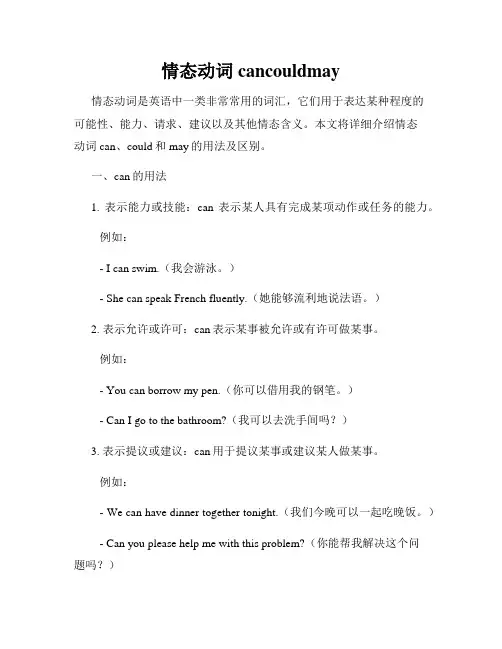
情态动词cancouldmay情态动词是英语中一类非常常用的词汇,它们用于表达某种程度的可能性、能力、请求、建议以及其他情态含义。
本文将详细介绍情态动词can、could和may的用法及区别。
一、can的用法1. 表示能力或技能:can表示某人具有完成某项动作或任务的能力。
例如:- I can swim.(我会游泳。
)- She can speak French fluently.(她能够流利地说法语。
)2. 表示允许或许可:can表示某事被允许或有许可做某事。
例如:- You can borrow my pen.(你可以借用我的钢笔。
)- Can I go to the bathroom?(我可以去洗手间吗?)3. 表示提议或建议:can用于提议某事或建议某人做某事。
例如:- We can have dinner together tonight.(我们今晚可以一起吃晚饭。
) - Can you please help me with this problem?(你能帮我解决这个问题吗?)1. 表示过去的能力或技能:could用于过去时态,表示过去某人具备的能力或技能。
例如:- When I was young, I could climb trees easily.(当我年轻的时候,我可以轻松地爬树。
)- He could speak three languages fluently when he was in college.(他在大学时能够流利地讲三种语言。
)2. 表示礼貌的请求:could用于礼貌地请求对方做某事。
例如:- Could you pass me the salt, please?(请你递给我盐好吗?)- Could I have a glass of water, please?(我能请你给我一杯水吗?)3. 表示非真实条件:could用于虚拟语气,表示非真实的条件或假设。
英语语法:情态动词英语语法:情态动词一、can和could1、can的用法(1)表示体力和脑力方面的能力。
(2)表示对现在的动作或状态进行主观的猜测,主要用在否定句和疑问句中。
(3)表示可能性,理论上的可能性,意为“有时候可能会”,可用于肯定句。
(4)表示允许,意思与may接近。
(5)表示说话人的推测、怀疑、惊异、猜测或不肯定等,主要用于否定句、疑问句或感叹句中。
(6)can的特殊句型cannot…too / enough表示“无论怎么。
也不过分”。
“越。
越好”。
cannot but+ do sth.表示“不得不,只好”。
2、could的用法(1)表示能力,指的是过去时间。
(2)表示允许,指的是过去时间。
(3)表示可能,可以指过去时间,也可以指现在时间,表示语气缓和。
(4)委婉客气地提出问题或陈述看法,指的是现在时间。
主要用于疑问句,回答时用can。
3、can与could的区别can表推测时只用于否定句和疑问句(could无此限制)。
couldn’t的可能性比can’t小。
4、can与be able to的区别(1)现在时:无区别,但后者不常用。
(2)完成时;can没有完成时,此时要用have(has,had)been able to。
(3)将来时:can没有将来时,要用will be able to。
(4)过去时:could表示一般能力,was/were able to 表示在具体场合通过努力成功做成某事的能力。
二、may 和might1、may的用法(1)表示询问或说明一件事可不可以做。
(2)表示一件事或许会发生或某种情况可能会存在,通常用在肯定句和否定句中。
注意:表示可能性时,can’t语气强,表示“不可能”,may not语气弱,表示“可能不”。
2、might的用法(1)表示询问或允许,指的是过去时间。
(2)表示可能发生的事,可以指过去时间,也可以指现在时间,语气更加不肯定,可能性比may小一些。
can 与could(可以能可能)1.表能力can(现在)现在能力could(过去)过去的能力I can speak a little English.I can play the piano.I could play basketball well when I was a kid.He could swim at the age of five.2.表可能性can(现在) 否定疑问居多could(现在-可能性极小/过去)This book could be Lily'sThat man can’t be my English teacher. He has gone to America.3.表允许许可can(不正式) could(礼貌)Could I please go out?请问我可以出去吗?Could I do the dishes?我可以洗餐具吗?Could I use your book?4.表请求can(不正式) could(礼貌)Could you please take out the rubbish?请你把垃圾倒掉好吗?Could you turn on the TV for me?你能帮我打开电视吗?答语中注意的问题肯定回答:Certainly./Sure./Of course./Yes,I agree.That’s OK./All right.等。
否定回答,通常以sorry开头。
I’m sorry I can’t./I’m afraid not./I’m really sorry,but…注意:如果问句中使用could,回答时要用can或can’t,不能用could或couldn’t。
—Could I use your pen?我可以用一下你的钢笔吗?—Sure,you can. ——当然可以。
固定结构Can’t…too/enough 再…也不为过W e can’t be too careful to cross the road.(过马路时,我们无论怎么小心也不为过)can’t help doing sth 情不自禁做某事can’t help to do sth 不能帮忙做某事can’t help but do sth 不得不做某事can but do sth 只好做某事We can but wait until Mary comes.即学即练( )1. —Could you please _____________me your notebook, Grace?—Certainly. Here you are.A. borrowB. to borrowC. lendD. to lend ( )2.Susan borrowed a car ________her friend.A.toB.fromC.withD.by ()3.— Hi,Jack! Could you come to our English party? — Sorry, I _______. I have to look after my little sister at home.A. mustB. couldC. can't( ) 4.Could you ________watch TV? I'm sleeping.A.don't pleaseB.not pleaseC.please not ( )5. — Could you please turn off the light? —______.A. Yes, I couldB. It doesn’t matterC. Yes, sure。
Can和Could用法_Can和Could的区别Can和Could 都是情态动词。
一般情况下,Could比Can 更礼貌(或者更正式)一些。
接下来,店铺为你分享Can和Could用法,希望对你有帮助。
Can和Could的用法(一):canThe three main uses of Can are: 1) ability 2) possibility and 3) permission. However there are some other uses of Can as we will see below.1. To express abilityCan means to be (physically) able to do something OR to know how to do something.I can speak two languages.2. To express a possibility (in general)This refers to a theoretical possibility.Note: we don't use can to talk about future possibilities. For this you would use may or might.I know you can win the competition.3. To offer to do something for othersCan is used when you offer to help someone or to do something for them.You don't need to walk home. I can take you there if you like.4. To ask for or give permission / To request somethingCan is used to ask for / request permission or to give permission.Note: Can't is used to refuse permission.Can means to be (physically) able to do something OR to know how to do something.Mary, you can play outside if you like.5. Can't: Something that is forbidden or not allowedYou can drive as fast as you want on the German motorways. Can和Could的用法(二):couldCould is similar to Can and often replaces Can in the past tense (though not always)1. To express ability in the pastShe could juggle eight balls when she was only 10 years old.2. Polite word used to ask for permission or to request something (in the present)Could I please use your bathroom?3. General permission in the pastHe couldn't go to the concert because his mother wouldn't let him.4. Couldn't: Sure that something is untrueJust like can't, you can use couldn't when you are sure that something isn't true or real.He couldn't have painted that. He has no artistic ability at all.5.Could: A conditional form ofCanWould + Can = Could. Note: Would be able to can replace could in the following examples.I could write the letter if you told me what to include.。
初一情态动词用法归纳情态动词有can (could), may (might), must, have to, shall (should, will (would), dare (dared), need (needed), ought to等。
情态动词无人称和数的变化;不能单独使用,必须与其后的动词原形构成谓语一、can, could1) 表示能力(体力、知识、技能)。
Can you lift this heavy box?(体力)Mary can speak three languages.(知识)Can you skate?(技能)此时可用be able to代替。
Can只有一般现在时和一般过去式;而be able to则有更多的时态。
I’ll not b e able to come this afternoon.当表示“经过努力才得以做成功某事”时应用be able to,不能用Can。
如:He was able to go to the party yesterday evening in spite of the heavy rain.2) 表示请求和允许。
-----Can I go now?----- Yes, you can. / No, you can’t.此时可与may互换。
在疑问句中还可用could,might代替,不是过去式,只是语气更委婉,不能用于肯定句和答语中。
---- Could I come to see you tomorrow?---- Yes, yo u can. ( No, I’m afraid not. )3) 表示客观可能性(客观原因形成的能力)。
They’ve changed the timetable, so we can go by bus instead.This hall can hold 500 people at least.4) 表示推测(惊讶、怀疑、不相信的态度),用于疑问句、否定句和感叹句中。
日常生活情态动词用法总结- 情态动词是英语中常用的一类动词,用于表示人的意愿、能力、推测、建议等情态。
下面是一些常见的日常生活情态动词的用法总结:1. Can- 可以表示能力或许可:- He can speak English. (他会说英语。
)- Can I go to the bathroom? (我可以去洗手间吗?)2. Could- 可以表示请求、能力或推测:- Could you help me with my homework? (你能帮我做作业吗?)- He could be at the library. (他可能在图书馆。
)3. May- 可以表示许可或推测:- May I borrow your pen? (我可以借用你的钢笔吗?)- He may arrive late. (他可能会迟到。
)4. Might- 可以表示或许的推测或请求许可:- I might go to the party tonight. (我今晚可能会去派对。
)5. Must- 可以表示必须或推测:- You must study for the exam. (你必须为考试研究。
)- It must be cold outside. (外面一定很冷。
)6. Should- 可以表示建议或期望:- You should eat more vegetables. (你应该多吃蔬菜。
)- He should be here by now. (他现在应该在这里。
)7. Ought to- 可以表示应该或期望:- You ought to listen to your parents. (你应该听父母的话。
)- He ought to be more careful. (他应该更加小心。
)8. Would- 可以表示客气的请求、愿望或假设:- Would you like some tea? (你想喝点茶吗?)- I would like to travel to Japan. (我想去日本旅行。
语法拓展:情态动词can 和could 的用法
表示能力:能,能够,会
He could swim when he was five. 他五岁时就会游泳了。
Can you drive a car? 你会开车吗?
—Yes, I can. 我会。
—No, I can’t.我不会。
表示推测:可能,会
I think the work can be completed ahead of time. 我认为这项工作能提前完成。
What can he mean? 他会是什么意思?
注:表示推测时,could 不是过去式,只是语气更委婉;若是推测已发生的事或过去
的情况,用can/could have 加过去分词。
如:
Today is Sunday. He can’t/couldn’t be at school. 今天是星期天。
他不可能在学校里。
Mike can’t have found his car, for he came to work by bus this morning. 迈克一定还没有找回他的车,因为早上他是坐公共汽车来上班的。
表示“有时也会”
It can be quite windy there, especially in spring. 那里有时容易刮风, 特别在春季。
表示允许:可以(口语中常代替may)
You can first lend me one book this time. 这次你可以先借给我一本书。
You can’t take the book out of the room. 你不可以将这本书拿出室外。
注意:
1. 表示允许别人做某事只能用can,不能用could。
2. can’t和mustn’t一样,都可表示“不准,不允许”。
表示请求:可以
Can I go swimming today, please, mum? 妈妈,我今天可以去游泳吗?
Could you tell me how I can get to the railway station? 请告诉我去火车站怎么走吗?注意:could 不是过去式,只是语气较can 更委婉,注意在回答中不可用could。
如:
—Could I have the television on? 我可以开电视看吗?
—Yes, you can. / No, you can’t.可以。
/ 不可以。
can 与be able to 的比较
(1) be able to 比can 有更多的时态。
如:
In the past 50 years or so, scientists have been able to “see” farther and farther into the sky. 在过去50 年里,科学家们已经能够往天空看得更远。
(2) 在表示过去具体某次能够成功做成某事时,只能用was/were able to。
如:
He worked very hard and was able to pass that examination. 他学习非常努力他以能够
通过了那场考试。